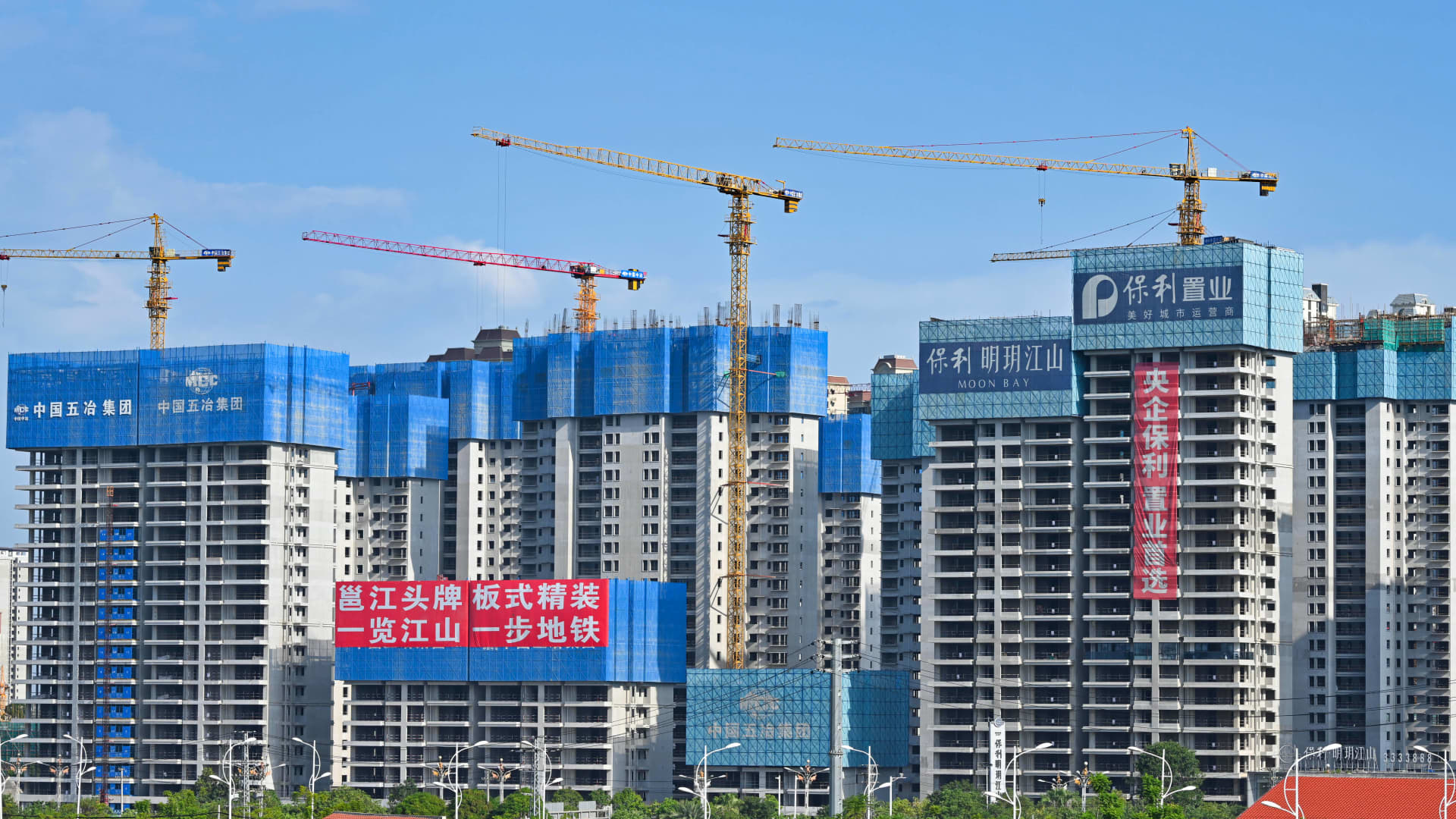
Analysts generally expect state-owned enterprises will perform better than non-state-owned developers in the latest real estate slump. Pictured here in Guangxi, China, on Aug. 15, 2022, is a real estate complex developed by state-owned conglomerate Poly Group.
Future Publishing | Future Publishing | Getty Images
BEIJING — Chinese property developers’ cash flows — a sign of the companies’ ability to stay afloat — shrank this year after steady growth over the last decade, according to Oxford Economics.
Developer cash flows through July are down 24% year-on-year on an annualized basis, according to analysis from the firm’s lead economist, Tommy Wu.
That’s a sharp slowdown from growth for nearly every year since at least 2009, the data showed. Total funding as of July was 15.22 trillion yuan ($2.27 trillion) on an annualized basis, versus 20.11 trillion yuan in 2021.
The drop comes as credit demand in China missed expectations in July, and property developers’ struggles drag on.
About two years ago, Beijing started to crack down on developers’ high reliance on debt for growth. Notably, Evergrande defaulted late last year. Other developers like Shimao have also defaulted, despite appearing to have healthier balance sheets.
While investors have turned cautious on Chinese property companies, developers now face the risk of losing another important source of cash flow: homebuyer pre-payments.
Homes are typically sold ahead of completion in China. But since late June, some homebuyers have protested apartment construction delays by halting mortgage payments.
“The crux of the problem is that property developers have insufficient cash flows – whether because of debt-servicing costs, low housing sales, or misuse of funds – to continue with projects,” Wu said in a report last week.
“Resolving this problem will rebuild homebuyers’ confidence in developers, which will help support housing sales and, in turn, improve developers’ financial health.”
More than $2 billion in high-yield property developer debt is due in September — that’s more than two times that of August, according to Morgan Stanley’s analysis as of Aug. 10.
About a quarter of homebuyers who bought property ahead of their completion are inclined to stop their mortgage payments if construction is suspended, the U.S. investment bank said in an Aug. 15 report, citing a proprietary AlphaWise Consumer Survey.
Not only does real estate account for the bulk of household wealth in China, but analysts estimate property and industries related to real estate account for more than a quarter of China’s GDP. The real estate slump has contributed to an overall slowdown in economic growth this year.
In an effort to support growth, the People’s Bank of China has cut rates, including an unexpected cut on Monday of 10 basis points to some one-year interest rates for institutions, known as the medium-term lending facility.
While the PBOC may hope the cut could ease some of homebuyers’ burden and help developers get loans, the problem isn’t just about funding, said Bruce Pang, chief economist and head of research for Greater China at JLL.
He noted how developers have found it harder to obtain funding on their own, and have had to rely more on pre-sales to homebuyers. But people are increasingly cautious about buying new homes due to their expectations for future employment and returns on existing investment products, he added.
Despite multiple reports of government plans to keep developers funded, the central government has yet to officially announce broader support for real estate. A readout of a high-level government meeting last month said local governments are responsible for delivering completed houses.
Among three major sources of developer funding, advance payments and deposits have fallen the most this year, down by 34%, according to Wu’s analysis.
Credit as a source of funding dropped by 22%, while self-raised capital, including stocks and bonds, was down by 17%, the annualized data showed.
Investors turn away from China property
Investment funds have largely stayed away from Chinese property developers, reducing a potential source of funding.
“What has been worrying has been the lack of willingness and speed by top policymakers in resolving real estate developer’s funding issues,” Carol Lye, assistant portfolio manager at Brandywine Global, said in an emailed response to CNBC.
Lye said the investment management firm’s allocation to China real estate is low, and that Brandywine holds “high quality real estate bonds that have been given preference in terms of government support.”
Some investors have even turned to companies in other parts of Asia.
“We’ve exited almost all of our holdings in China residential. It’s more a wait-and-see game in terms of getting back exposure,” said Xin Yan Low, Singapore-based portfolio manager for Asia property equities at Janus Henderson. She declined to share a timeframe of those sales.
“There are still many alternatives in the region, especially with reopening now, Singapore, Australia, basically back to full reopening, fundamentals are strong,” she said.
Top holdings in her co-managed Horizon Asia-Pacific Property Income Fund include Japan Metropolitan Fund Invest, Mapletree Logistics Trust and Hang Lung Properties.
Morningstar’s Patrick Ge said in a report this month that some funds have turned away from China property to other Asia high-yield sectors, such as Indian renewable energy companies and Indonesian property.
Overall, the report said money invested in China property funds dropped by 59% over six months.
But the report said investment giant BlackRock was among firms buying China real estate bonds — including those of Shimao.
The asset manager did not respond to a CNBC request for comment.
— CNBC’s Michael Bloom contributed to this report.
